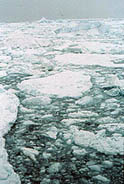Global warming weakens Pacific Ocean wind pattern - 3 May, 2006 - News
An important wind circulation pattern over the Pacific Ocean has begun to weaken because of global warming caused by human activity, something that could alter climate and the marine food chain in the region, new research suggests.

It's not clear what climate changes might arise in the area or possibly beyond, but the long-term effect might resemble some aspects of an El Nino event, a study author said.
El Ninos boost rainfall in the southern United States and western South America and bring dry weather or even drought to Indonesia, Malaysia and elsewhere in the western Pacific.
As for the Pacific food chain near the equator, the slowdown might reduce populations of tiny plants and animals up through the fish that eat them, because of reduced nutrition welling up from the deep, said the author, Gabriel Vecchi.
Vecchi, a visiting scientist at a National Oceanic and Atmospheric Administration lab in Princeton, New Jersey, and colleagues present their results in Thursday's issue of the journal Nature.
The slowdown was detected in shipboard and land-based data going back to the mid-1800s. It matches an effect predicted by computer climate simulations that trace global warming to a build-up of heat-trapping greenhouse gases, the researchers report. But simulations that consider only natural influences fail to produce the observed slowdown, Vecchi said.
So, it appears the slowdown is largely due to the man-made buildup of greenhouse gases, the researchers concluded. And the result lends more credibility to computer models that trace global warming to greenhouse gases, at least for their ability to forecast what will happen in the tropics, Vecchi said.
The study focused on what scientists call the Walker circulation, a huge wind pattern that covers almost half the circumference of Earth.
The pattern traces a huge loop. Trade winds blow across the Pacific from east to west. The air rises in the western Pacific and then returns eastward at an altitude of a few miles. Then it sinks back to the surface and starts the loop again.
The new study is based on barometric pressure readings, since differences in air pressure drive winds near the equator. Results suggest the average wind speed in the Walker circulation has weakened by about 3.5 percent since the mid-1800s. It has weakened faster since World War II than in the long-term trend since the mid-1800s, Vecchi said.
Computer simulations say the circulation might weaken another 10 percent by 2100, Vecchi said.
Dennis Hartmann, a professor of atmospheric sciences at the University of Washington, said the study makes a strong case that the Walker circulation has slowed. While such an effect had been predicted as a result of global warming, he said, "it's not been demonstrated before as clearly as they've done here," reports AP.
O.Ch.
Subscribe to Pravda.Ru Telegram channel, Facebook, RSS!


